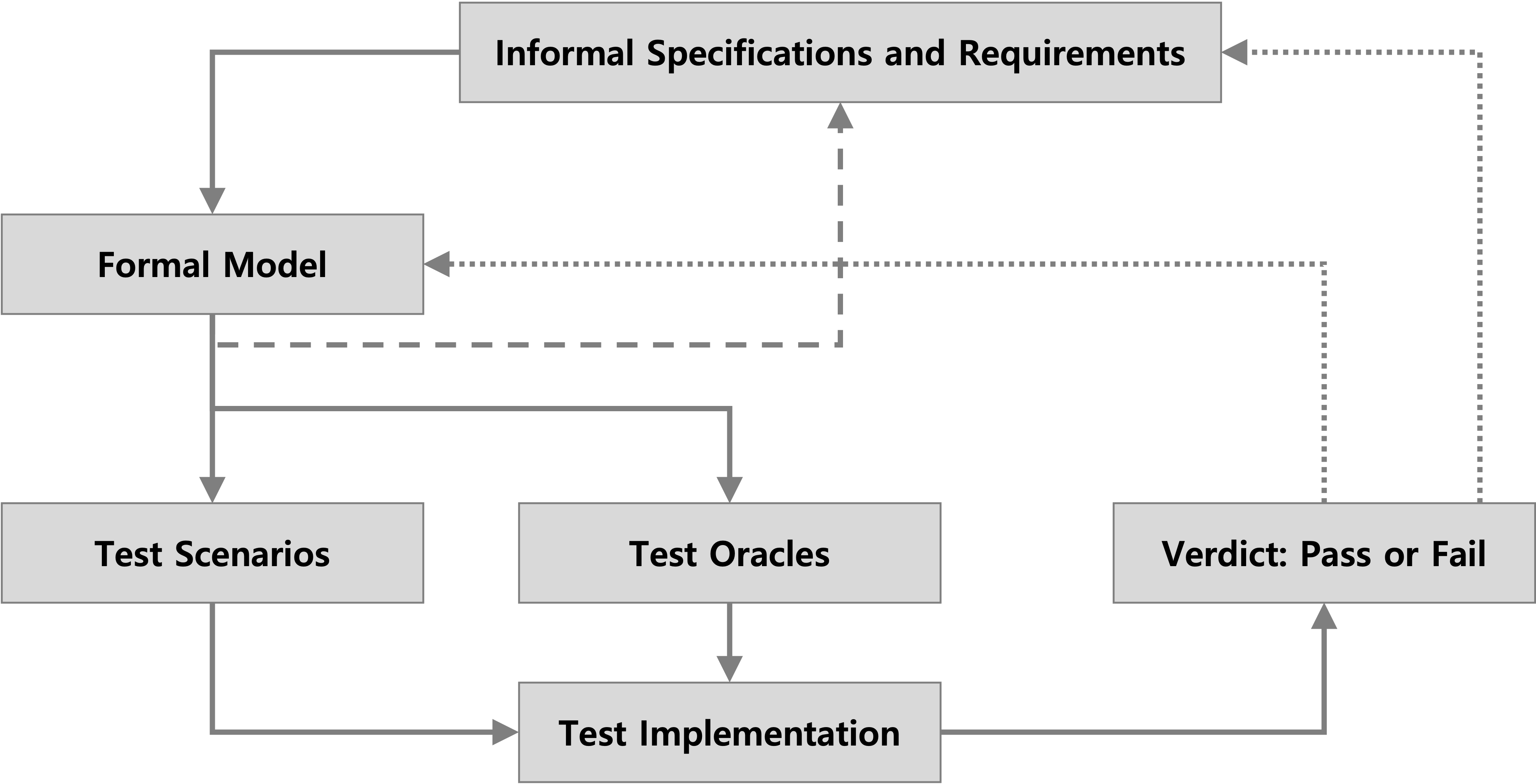TLS Model-based Testing using Maude
Introduction
Transport Layer Security (TLS) is a core protocol that ensures secure communication over the Internet, widely used in applications such as HTTPS. However, many vulnerabilities (e.g., CVE-2022-25640) arise when implementations fail to comply with the RFC requirements (MUST statements). Therefore, verifying the correctness of TLS implementations is crucial.
Previous research has employed formal verification, fuzzing, combinatorial testing, and differential testing to analyze the security of TLS. While effective to some extent, these approaches fail to bridge the gap between specification and implementation or to capture complex attack scenarios such as man-in-the-middle (MITM) attacks. Our research combines Maude-based formal modeling with model-based testing (MBT). We build a formal model of TLS and automatically generate test scenarios that are executed against real TLS libraries, ensuring compliance with protocol specifications.
TLS Protocols
TLS establishes an encrypted and authenticated channel between a client and a server through a handshake process that negotiates cryptographic parameters. Libraries such as OpenSSL and WolfSSL implement TLS based on specifications like RFC 5246 (TLS 1.2) and RFC 8446 (TLS 1.3). Many vulnerabilities are caused by deviations from these specifications, making rigorous testing essential.

Model-based Testing
Model-based testing (MBT) is a software testing methodology where a formal or abstract model of the system’s behavior is used to automatically generate test cases. In this approach, a model describes the system in terms of states, transitions, and input/output actions, reflecting its expected behavior and requirements. Test cases are systematically derived by exploring different paths through the model, ensuring broad coverage of possible system behaviors. Since the model is closely tied to the system’s specifications, MBT provides strong traceability to requirements and helps validate both functional and security properties. Moreover, MBT enables high levels of automation, as the test generation and execution processes can be driven entirely by the model without extensive manual effort.

Maude Model
We model TLS clients and servers as Maude objects with attributes such as protocol version, cipher suites, keys, and message buffers.
- Server/Client Components: Each role (client, server, attacker) is defined as a class with its own state and attributes. ``` class TLS | version : ProtocolVersion, ciphers : List{CipherSuite}, publicKey : Set{Key}, privateKey : Set{Key}, certificates : List{Certificate}, extensions : Extension, masterSecret : Nonce, sessionId : Nonce, … inputBuffer : List{Msg}, outputBuffer : List{Msg}, hash : Nonce, nonceCtr : Nat .
| class Client | clientState : ClientState . |
| class Server | serverState : ServerState . |
subclass Client Server < TLS
- Behavioral Rewrite Rules: TLS message exchanges (e.g., ServerHello, ClientKeyExchange) are described as rewrite rules that define state transitions and message generation.
rl [buildServerHello] < SI : Server | serverState : V3S-READY, nonceCtr : N, version : PV, cipher : CS, extensions : EXT, sessionId : SID, outputBuffer : MSGS > => < SI : Server | serverState : V3S-CH, nonceCtr : s N, outputBuffer : MSGS :: htype(server-hello) version(PV) suites(CS) random(nonce(CI, N)) extension(EXT) > .
crl [processServerHello] < CI : Client | clientState : V3C-READY, nonceCtr : N, version : PV, cipher : CS, extensions : EXT, sessionId : SID, inputBuffer : MSG :: MSGS > => < CI : Client | clientState : V3C-CH, inputBuffer : MSGS > if validVersion(PV, MSG) /\ validCipherSuite(CS, MSG) /\ validSessionId(SID, MSG) /\ validExtension(EXT, MSG) .
## Scenario Generation
RFC 5246 and RFC 8446 specify many MUST statements (e.g., “A client receiving an unsupported cipher suite MUST abort the handshake”). We encode these requirements into Maude-based formal properties, which are used to generate targeted test scenarios.
For example, RFC 8446 says
"The single cipher suite selected by the server from the list in ClientHello.cipher_suites. A client which receives a cipher suite that was not offered MUST abort The handshake with an “illegal_parameter” alert."
We generate the following test scenario:
… var v0 := recv(client); … var v1 := buildSH(tls-13, TLS_ECDHE_ECDSA…, …); var v2 := change(v1,cipher_suite,TLS_DHE_DSA…); send(client, v2); var v3 := recv(client); assert(v3.Desc == illegal_parameter); ```
Scenario Execution
TLS-Attacker Library: We use the TLS-Attacker framework to execute the generated test scenarios. TLS-Attacker allows flexible message construction and dynamic modification during the handshake process. The scenarios derived from Maude are translated into TLS-Attacker scripts, which interact with real TLS libraries (e.g., OpenSSL) to verify compliance with protocol requirements.
Contact
Jaehun Lee thkighie1224 (at) postech.ac.kr
Last modified: 2025/07/24 02:40:42 (Jaehun Lee)